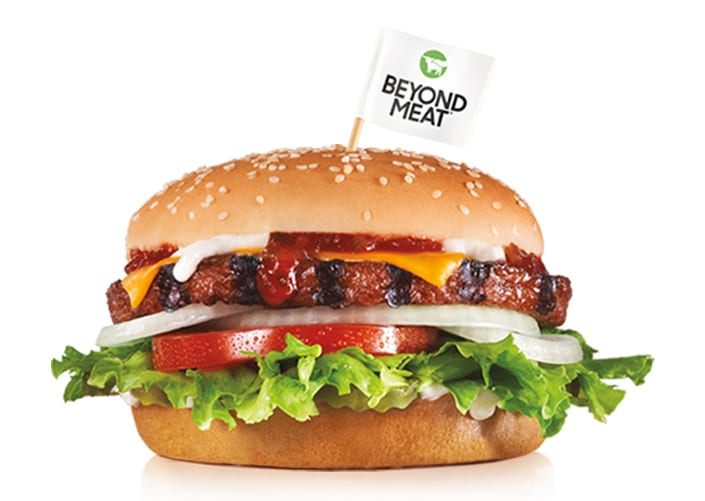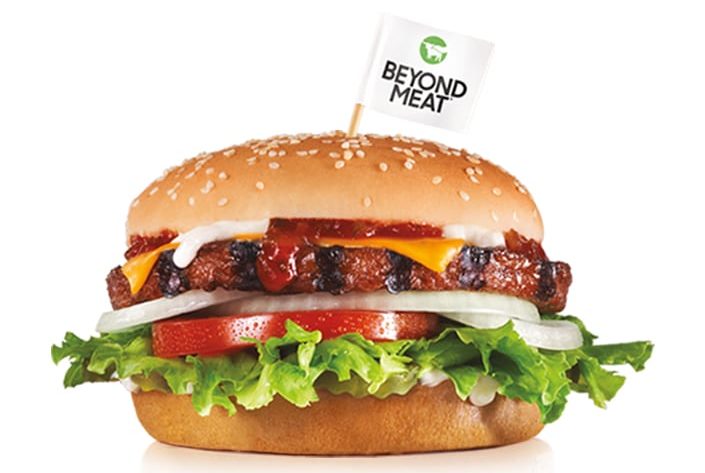Meatless meat is becoming mainstream making Meatless Mondays easier than ever. Launched in 2019, Carl’s Jr.’s has served up nearly 12 million of their plant-based patties. With National Hamburger Day coming up this month, here’s how the faux-meat, higher-tech burgers compare with the real thing.
The Big Players in the Meatless Meat Market
Veggie burgers (such as mushroom, black bean, tofu, and lentil burgers) been around for decades, but only recently have plant-based burgers become higher-tech and have started to “bleed”.
The Beyond Burger and Impossible Burger have figured out how to resemble real raw ground beef and make it look bloody.
- Impossible Burger — Uses soy leghemoglobin (short for legume hemoglobin), which literally makes the burger “bleed”.
Leghemoglobin is found on the roots of legume plants and is chemically and structurally similar to hemoglobin. When leghemoglobin is heated, it releases its heme (blood-red fluid).
Cook your burger to medium-rare, and when you take a bite, the “bloody” juices will be released. But in order to meet the demand for these juicy burgers, the leghemoglobin is produced by genetically modified yeast cells.
- Beyond Burger — Uses beet juice extract as its “blood” source.
The Nutritional Rundown
Source of Protein The faux-meat burgers use different ingredients as a protein source, which produce their own unique taste.
- Beyond Burger: “pea protein” (a formulation of peas, mung beans, and brown rice). Protein isolated from plants are highly processed and don’t count as a vegetable.
- Impossible Burger: Genetically-modified soy product and potato. Impossible Foods touts they use 95% less land and 74% or less water compared to cattle production.
| Protein m | Sodium mgmg | |
| Beef, 80% lean | 19 g | 75 mg |
| Beyond Burger | 20 g | 380 mg |
| Impossible Burger | 19 g | 370 mg |
| Calories | Calories from Fat | |
| Beef, 80% lean | 287 | 72% |
| Beyond Burger | 270 | 67% |
| Impossible Burger | 240 | 53% |
| Fat gram | Saturated Fat gm | |
| Beef, 80% lean | 23 g | 9 g |
| Beyond Burger | 20 g | 6 g |
| Impossible Burger | 14 g | 8 g |
Source of Fats
- Beyond Burger: cocoa butter, coconut oil, sunflower oil, and canola oil (The cocoa butter and the coconut oil add the “faux marbling” in the product.)
- Impossible Burger: coconut oil, sunflower oil
 Beyond Famous Star® with Cheese
Beyond Famous Star® with Cheese
- Protein: 33 gm
- Sodium: 1600 (over the daily limit)
- Calories: 700
- Calories from fat: 396 (51.4% of total calories)
- Total fat: 44 gm
- Saturated fat: 13 (the maximum intake on a 2,000-calorie diet)
Should You Eat These Plant-Based Burgers?
It depends — it depends on what you’re going for, e.g., is your objective to be more environmentally conscious, healthy, or do you just want to reduce your intake of red meat?
If you’re going for healthy, then these burger substitutes are not a good meat substitute. The manufactured “plant-based” patties won’t get you closer to your 5 to 7 servings of vegetables a day.

![]() Karen’s Fit Tip: These faux burgers are made with ultra-processed ingredients, and are highly processed to manufacture and mass produce.
Karen’s Fit Tip: These faux burgers are made with ultra-processed ingredients, and are highly processed to manufacture and mass produce.
They’re very high in sodium and saturated fat with no actual vegetables present unlike other “veggie burgers” on the market.
Easily make your own burgers with black beans, salmon, veggies, and your favorites spices.

